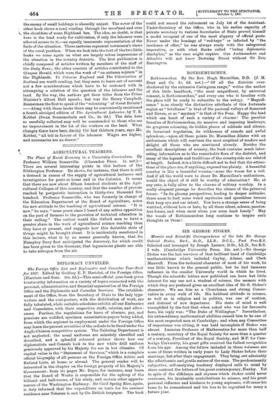SIR GEORGE STOKES.
Memoir and Scientific Correspondence of the late Sir George Gabriel Stokes, Bart., Sc.D., LL.D, D.C.L., Past Pres.R.S. Selected and Arranged by Joseph Larmor, D.Sc., LL.D., Sec.R.S. 2 vols. (Cambridge University Press. 24s. net.)—Sir George Stokes was the last survivor of that brilliant band of Cambridge mathematicians which included Cayley, Adams, and Clerk Maxwell. From the technical character of most of his work, he was little known to the general public, but he had immense influence in the smaller University world in which he lived. Though the scientific letters now published can have but little interest for any one not a student of science, the memoir with which they are prefaced gives an excellent idea of Sir G. Stokes's character. We see him as a Churchman and strong Conser- vative in every walk of life. His habitual attitude in science, as well as in religion and in politics, was one of caution, and distrust of new departures. His state of mind is well exemplified by the fact that when asked who was his favourite hero, his reply was : "The Duke of Wellington." Nevertheless, his extraordinary mathematical abilities caused him to be one of the most respected men at Cambridge; and when any Committee of importance was sitting, it was held incomplete if Stokes was absent. Lucasian Professor of Mathematics for more than half a century, secretary of the Royal Society for more than a quarter of a century, President of the Royal Society, and M.P. for Cam- bridge University, his great gifts received the fullest recognition hem his age. Among the letters included in these volumes are some of those written in early years to Lady Stokes before their marriage, but after their engagement. They bring out admirably the affectionate and gentle nature of the man. The predominantly subjective, self-analysing tendency displayed calls to mind by sheer contrast the letters of his great contemporary, Huxley. Yet in spite of the diffidence and shyness which Stokes could never overcome, his invaluable contributions to science, and his great personal influence and kindness to young aspirants, will cause his fame to be remembered and his loss to be regretted for many a future year.






























































 Previous page
Previous page